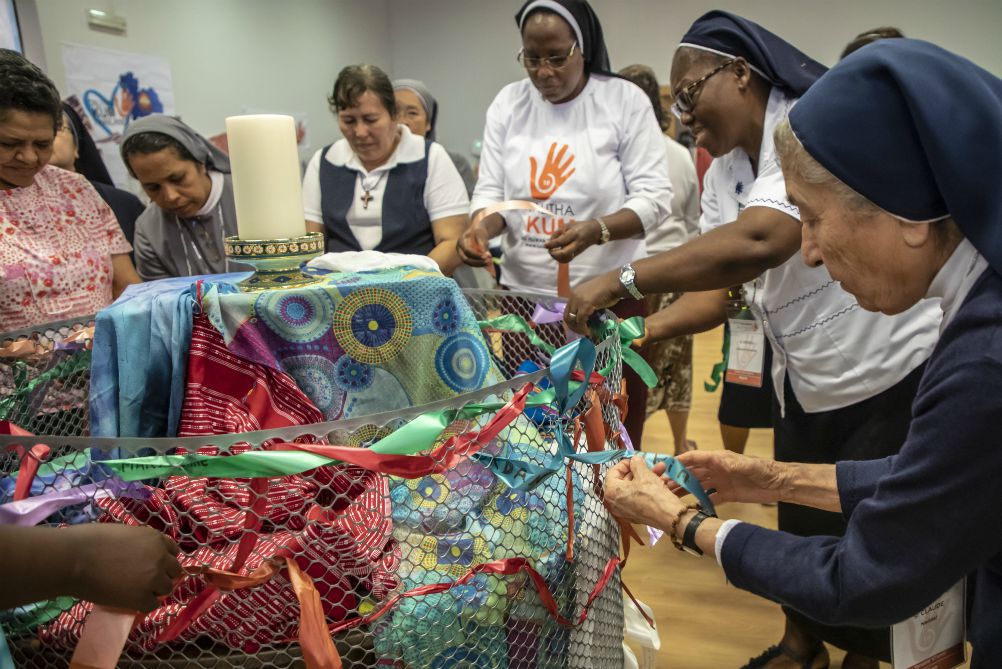
Sisters tie ribbons with the name of their country and a trafficking survivor with whom they have worked Sept. 27 at the 10th anniversary gathering of Talitha Kum in Rome. Sisters later took a different ribbon with the intention of keeping that survivor in their prayers. (Courtesy of Talitha Kum)
Sr. Mercy Muthoni would often suffer sleepless nights when she heard from the Cameroonian girls she helped escape trafficking in Kuwait.
They'd call to tell her they hadn't eaten for days, or that one of them was sick and they were struggling to carry her for part of their journey.
"Even if I go to bed, it keeps ringing in my mind," said Muthoni, a Missionary Sister of Our Lady of the Holy Rosary who ministers in the English-speaking region of Cameroon.
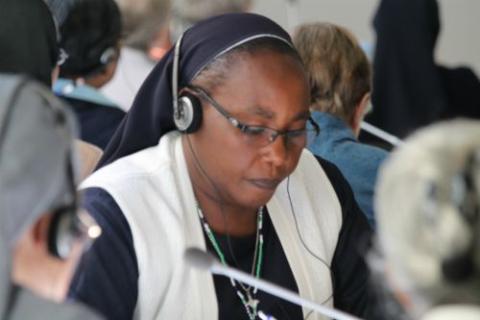
Sr. Mercy Muthoni, a Missionary Sister of Our Lady of the Holy Rosary and founder of Cameroon's new Talitha Kum network (Courtesy of Talitha Kum)
"When they say especially that they have not eaten for two days, I would go without eating. I carried their suffering with me, and it was really weighing me down," she said.
Without a Cameroonian embassy in Kuwait, this particular case wound up resolved as sisters connected across countries with the help of Talitha Kum, the international umbrella network for sisters against trafficking.
"There are times I say, 'I need to take a break.' But the pressure will be too much that I'm not able to," Muthoni said.
The stress, sadness and anger that comes with ministering to trafficking victims — a ministry where the realities are dark and the stakes feel high — is not unique to Muthoni. The work of women religious often cannot be contained in a tidy 9-to-5 schedule that allows them to set aside those experiences at the end of a workday. Many sisters work through their weekends, either in this field or for their other jobs.
How women religious recharge and care for themselves is what allows them to persevere in challenging ministries. Music, meditation, stitching, retreats — Talitha Kum sisters find different ways to bring peace and distraction into their lives, putting on pause the tragedies that occupied their minds throughout the day.
"Giving life to others gives you life. That becomes an energizing force for us," said Bethany Sr. Jyoti Pinto, from India.
"We look at those vulnerable people's faces, their tears, their sufferings, and then with that compassion, we are moved to do something for them, to free them from those kinds of terrible situations in which they are in," said Pinto, the coordinator of the Asian Movement of Women Religious Against Human Trafficking.
"That is a movement within, and it is not humanly possible unless we have a divine strength and energy to keep it going year after year, day after day."
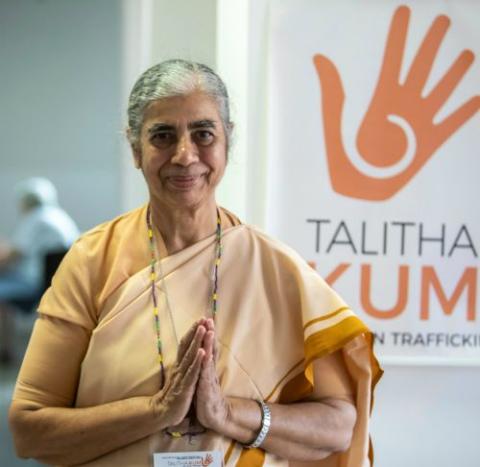
Bethany Sr. Jyoti Pinto, coordinator of the Asian Movement of Women Religious Against Human Trafficking (Courtesy of Talitha Kum)
'Breathe it in, be with it, be centered'
Muthoni said she has learned to tell herself a "story" to help her cope with not being able to help everyone: "I am not the savior of the world, and I cannot do everything. One day at a time, one moment at a time, because if I try to cover everything, I will not be of service to them."
The recent founder of Talitha Kum's presence in Cameroon, Muthoni has learned to incorporate regular time off into her schedule, taking two days off a month without her phone and visiting her family in Kenya for two months every other year.
"Within that time, I make sure I take a bit of a retreat, rest, connect with my family and friends and just forget about it a bit," she said.
Dorothean Sr. Mary Quiroga from Argentina said even during time away, "you still have them on your mind."
"I'll be on a mission heading somewhere else, and when I cross [a] border, immediately, I think, 'How many others have crossed illegally? Who came to my country looking for work?' They are always present with me. When you embrace a cause, you can't get it out of your heart."
For Quiroga — and for nearly every other sister who spoke to Global Sisters Report for this story — daily prayer is vital for finding peace and strength.
"Oftentimes, we feel helpless or that we're doing so little within this immense scourge. Prayer is what, above all, sustains me," she said.
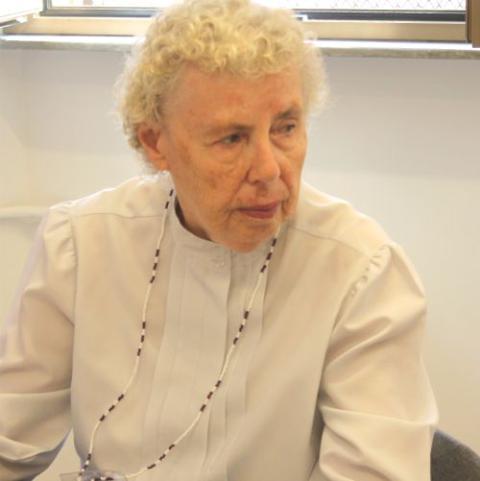
Sr. Jean Schafer, a Sister of the Divine Savior from the United States (Courtesy of Talitha Kum)
Sr. Jean Schafer, a Sister of the Divine Savior from the United States, said she enjoys beginning her day with prayer, the "quiet, calm centering, and that immediately is self-care."
"As you pray ... your mind turns to some issue, and then you can bring that into your prayer, you can hand that circumstance over to God and say, 'In your providence, you know about this, and you're going to guide us in whatever it is we have to do to help this individual,' " she said. "You feel your dependency on God in that prayer, and you count on that inspiration."
Schafer, who belongs to U.S. Catholic Sisters Against Human Trafficking, added that the hope she gets from staying in touch with survivors who now have fulfilled lives serves as a reminder that "you can do that for others, too."
In Japan, Maryknoll Sr. Abby Avelino said meditation is a typical practice, done three to four times a day.
"Sometimes we forget to breathe, so that's my self-care," she said. "Of course, I'm being mindful of what's happening [in the world], so just breathe it in, be with it, be centered. Breathe in a prayer."
When Sr. Margaret Gonzi, who ministers in Malta, starts her day reading the Gospel, she said she is reminding herself why she is in this ministry at all.
"That is what gives me meaning," she said.
"At the same time, my concern is: What is happening to the trafficked persons in this moment that I don't know about? What can I do? I can't do anything, but I can keep them in my heart and reflect that the Lord knows ... . I feel I'm with them in the Lord's presence. That gives me meaning: sitting in the presence of the Lord."
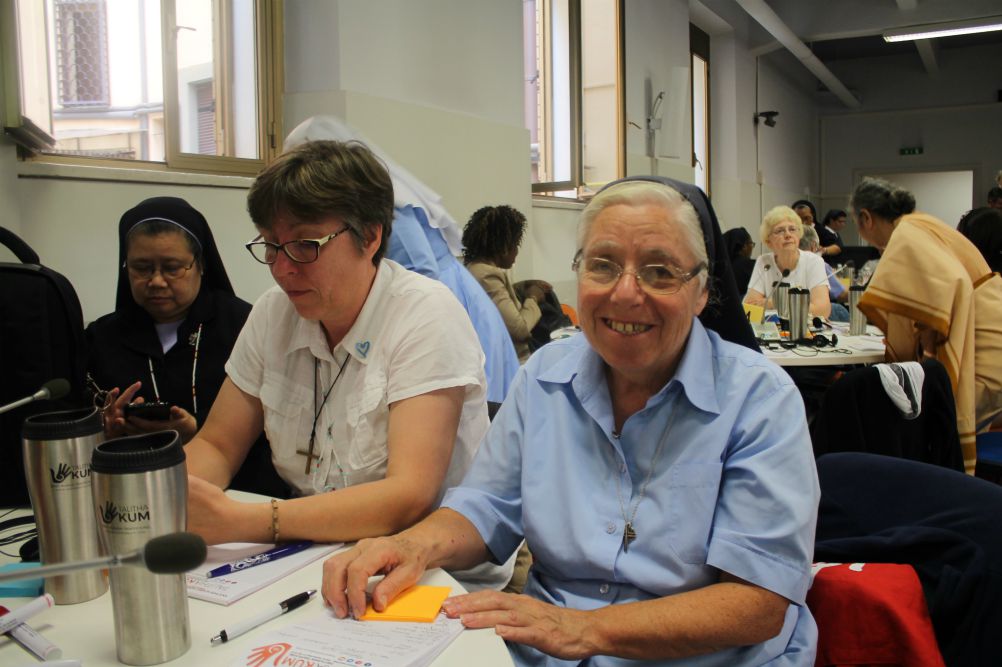
Sr. Margaret Gonzi, a Sister of Our Lady of Charity of the Good Shepherd who ministers in Malta, participates in group discussions at the 10th anniversary gathering of Talitha Kum, held Sept. 21-27 in Rome. (Courtesy of Talitha Kum)
Gonzi, a Sister of Our Lady of Charity of the Good Shepherd, said sewing is also a good distraction.
"There's no need to spiritualize everything. It just takes my mind off things," she said, adding that art and Spanish lessons are also positive outlets for her.
When she learns of little girls who have been kidnapped and mutilated, girls whose journeys she's followed only to hear eventually of their deaths, Charity Sr. Kathleen Bryant said she has to figure out, "How do I protect my heart so I can be a joy-filled woman? Because the personal stories I hear, they break my heart."
A classical pianist, Bryant, who lives in Los Angeles, said music and dancing "makes me feel whole and healed," adding that she has a "creative prayer life."
"I greet the morning and try to be as still as I can be, breathing, attentive, like an animal on the hunt ... . When I calm down, my monkey brain that's racing, I connect with the universe. I try to feel that deep connection and pay attention to what surfaces, feeling that that's my word from the cosmos for the day. Sometimes it's the sense of communion with the birds I hear outside, with all of creation, and that helps my heart heal."
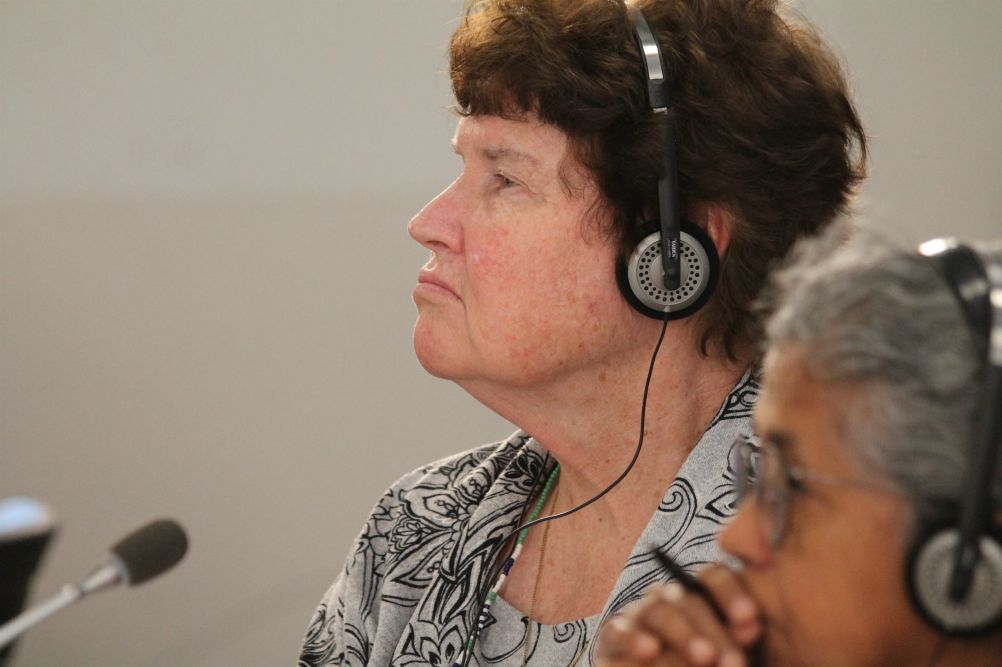
Sr. Kathleen Bryant, a Religious Sister of Charity and member of U.S. Catholic Sisters Against Human Trafficking (Courtesy of Talitha Kum)
When Bryant learned of a 12-year-old girl* who needed money for vaginal and anal reconstructive surgery after five years in slavery suffering sexual violence, she turned to her congregation to help raise money to pay for her needs. But just months after the procedure, on Easter Sunday in 2017, Bryant learned that the cartel had executed her.
"That one knocked me out for a week. She had been sold at age 7, and she escaped," Bryant said the girl had told another sister. "She'd always cover her hands, saying, 'I never want to see my hands again after the things they made me do with my hands.' And then they killed her. I was so mad at God."
A photo of the girl smiling, however, has always stayed with Bryant.
"I thought, at least she knew what it was like to be loved the last three months of her life. She was with sisters. She got help for surgery and therapy, so she knew love. And if every human being could know that they were loved at one point, then alleluia."
Advertisement
'Alone, you'll burn out'
When she's not rereading Platero y Yo by Spanish writer Juan Ramón Jiménez, Guardian Angel Sr. Carmela Gibaja Izquierdo said she finds peace in prayer after a long day. "Having time to pray and think, how did I live out my day? What does this all mean for me? Is this how I ought to spend my time?"
Gibaja, coordinator of Red Ramá, El Salvador's anti-trafficking network, said coming home "burdened from all you've seen and done that day" is precisely when the benefits of living in community are most felt: "to talk about what we've all witnessed, it eases our load when we share it."
Sr.Ana María Vilca Mamani from Peru, a Sister of the Holy Names of Jesus and Mary, said because this is such a "heavy ministry," if one doesn't work in groups or with networks, "alone, you'll burn out."
Vilca said that Red Kawsay, Peru's anti-trafficking network for sisters, is also about "caring for those who care for others."
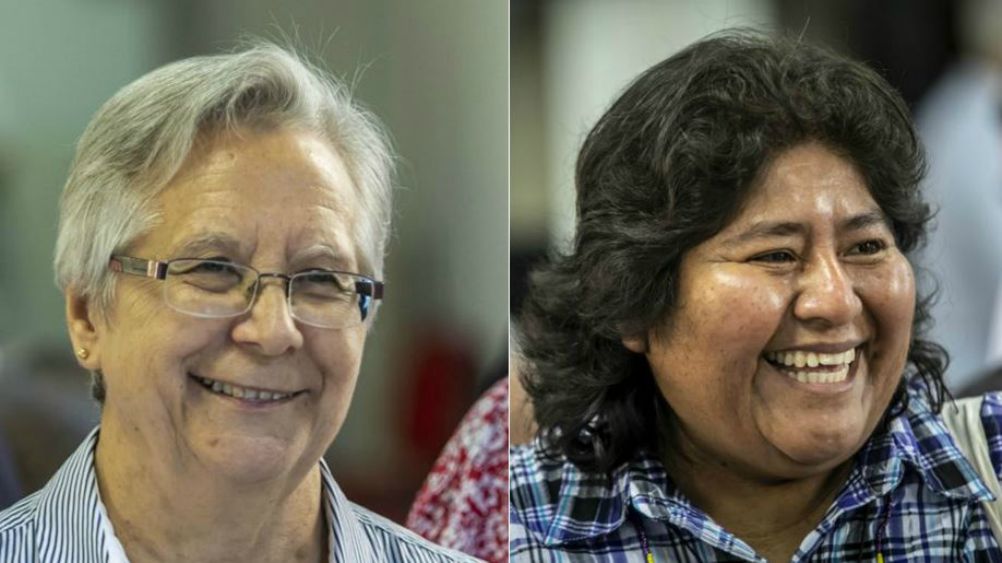
Left: Guardian Angel Sr. Carmela Gibaja Izquierdo is the coordinator of El Salvador's Talitha Kum network, Red Ramá; Right: Sr. Ana María Vilca Mamani, a Sister of the Holy Names of Jesus and Mary, ministers in Peru (Courtesy of Talitha Kum)
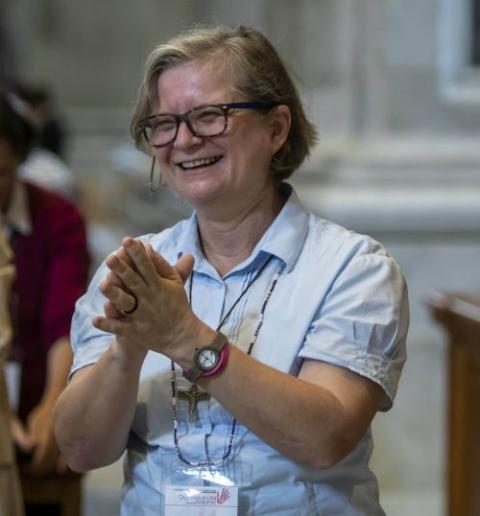
Comboni Missionary Sr. Gabriella Bottani is the international coordinator for Talitha Kum (Courtesy of Talitha Kum)
Comboni Missionary Sr. Gabriella Bottani said belonging to the Talitha Kum network is itself self-care.
"More and more, I realize that our gatherings are not only for planning, but that it is a way to feel that we are not alone, that we can share and understand one another because we all have those experiences," said Bottani, Talitha Kum's international coordinator.
Celebrating Talitha Kum's 10th anniversary in Rome, where representatives from each country's network gathered Sept. 21-27, Gibaja echoed Bottani's sentiment, saying the gatherings are important "because you're in an environment where you are in tune with others, speaking this same language of problems and hopes and illusions — that gives you encouragement.
"It tells me I'm not wasting my time, that I'm doing something worthwhile," she said.
Bottani recalled Pope Francis' words to the Talitha Kum sisters during their Sept. 26 private audience, when he told the sisters that at the end of their days, they should think of the faces of the victims they've helped.
"This will be a beautiful prayer," he told them.
To support and empower one another, Bottani said, is also a "deep prayer, because many of us feel alone throughout the activity."
*GSR has updated this anecdote to correct a couple of details, such as the girl's age and who paid for her surgery.
[Soli Salgado is a staff writer for Global Sisters Report. Her email address is ssalgado@ncronline.org. Follow her on Twitter: @soli_salgado.]







